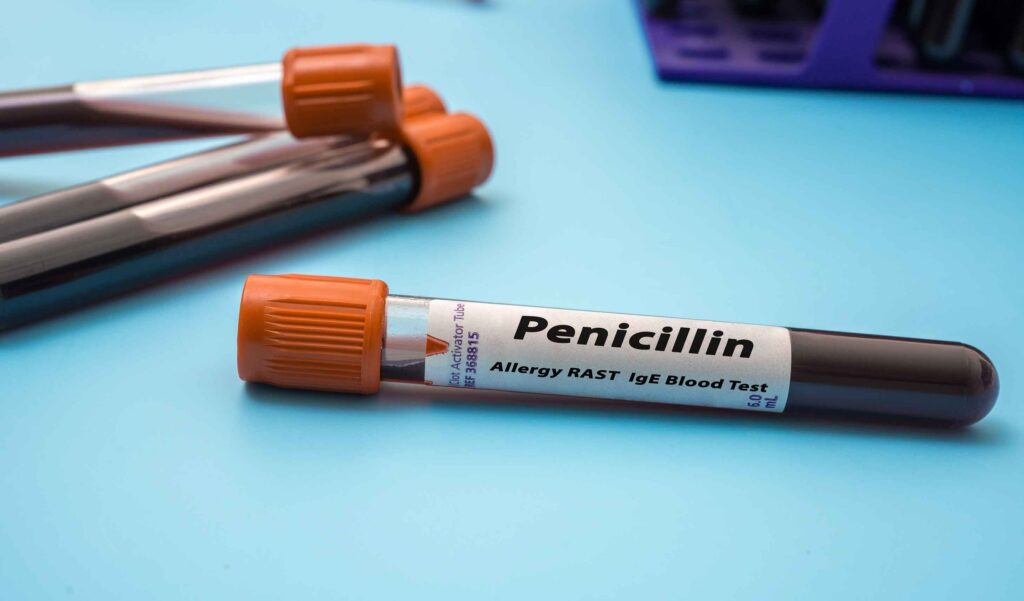Did you know that about 10% of Americans have an allergy to penicillin, but fewer than 1% are truly allergic? This significant gap presents a challenge for healthcare providers when it comes to prescribing the most effective antibiotics for patients.

The good news is that recently Congressman Larry Bucshon, MD (R-IN) introduced the Penicillin Allergy Verification and Evaluation Act (PAVE Act) to Congress with bi-partisan support. The PAVE ACT would make penicillin allergy evaluation a part of the initial preventive physical examination under the Medicare program.
Mason City Clinic’s allergy & immunology physician, Daniel Hamilos, MD, says this legislation would help thousands of Iowa seniors get the best medical care. If passed, the bill could have profound impact on patient outcomes, healthcare costs, and the fight against drug-resistant bacteria.
At Mason City Clinic’s Allergy & Immunology department, we offer penicillin allergy testing for both adults and children to help patients regain access to this vital medication. Here’s why the PAVE Act is crucial and how penicillin allergy testing can improve healthcare for millions of Americans.
So why is this mislabeling so common?
Many patients believe they are allergic to penicillin based on childhood reactions that may have been misinterpreted or that they have since outgrown. Others may have experienced non-allergic side effects, such as a rash, which can be confused with an allergy. Unfortunately, once a patient is labeled as “penicillin allergic,” this label follows them throughout their lives, often without reevaluation.
The goal of the PAVE ACT is to reduce the burden on patients who are labeled as “allergic to penicillin”. Being labeled as “penicillin allergic” is a barrier for physicians who wish to prescribe the most appropriate and effective antibiotic to a patient who has an infection. Alternative antibiotics to penicillin are generally more costly, less effective and have other unintended side effects, such as increasing the length of the hospital stay and promoting drug-resistant bacterial infections. Penicillin allergy testing is typically done by an allergist in the clinic. The procedure takes less than 2 hours to perform, and if the testing is negative, the patient can be confirmed to no longer be allergic to penicillin. This is what we call “penicillin allergy delabeling”.
Penicillin allergy testing is a straightforward procedure typically performed by an allergist. At Mason City Clinic, the process begins with a detailed history and examination to assess your risk for a true penicillin allergy. The test itself involves a skin test that can be completed in less than two hours.
During the test, a small amount of penicillin is applied to the skin, and a specialist monitors the reaction. If the skin test is negative, the patient will undergo an oral challenge by taking a small dose of penicillin under medical supervision. If there is no reaction, the patient can safely be delabeled as allergic to penicillin.
This process, known as penicillin allergy delabeling, is highly beneficial. Once delabeled, patients can safely take penicillin in the future, allowing healthcare providers to prescribe the best antibiotic for their needs without concern for potential allergic reactions.

Penicillin allergy delabeling offers a wide range of benefits, not just for individual patients but also for the broader healthcare system. Here’s why it matters:
At Mason City Clinic, we routinely perform penicillin allergy testing as part of our Allergy & Immunology services. Our team of board-certified allergists is skilled in diagnosing and treating allergies in both adults and children. If you’ve been told you’re allergic to penicillin, we encourage you to schedule a consultation with our team to see if penicillin allergy delabeling is right for you.

The PAVE Act represents a crucial step in improving healthcare for patients across the country. By promoting penicillin allergy testing as part of routine care, it helps remove barriers to the most effective treatments, lowers healthcare costs, and fights antimicrobial resistance.
If you believe you or a loved one may have been incorrectly labeled as allergic to penicillin, take the first step toward better health by contacting Mason City Clinic today. You can learn more about our Allergy & Immunology services at Mason City Clinic or call us at 641-494-5380 to schedule an appointment.
Don’t let an incorrect diagnosis limit your access to the best possible care. Penicillin allergy testing is quick, safe, and can dramatically improve your treatment options.
Up-to-date. Down-to-earth. Close to home. Lots of great reasons to make Mason City Clinic
your first choice for all your family’s specialty healthcare needs.
250 S. Crescent Drive, Mason City, IA 50401
Tel: 641.494.5200
Toll Free: 800-622-1411
Fax: 641.494.5403